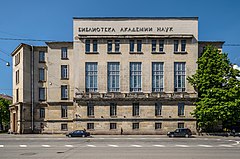
Alexei Arkhipovich Leonov was a Soviet and Russian cosmonaut and aviator, Air Force major general, writer, and artist. On 18 March 1965, he became the first person to conduct a spacewalk, exiting the capsule during the Voskhod 2 mission for 12 minutes and 9 seconds. He was also selected to be the first Soviet person to land on the Moon although the project was cancelled.
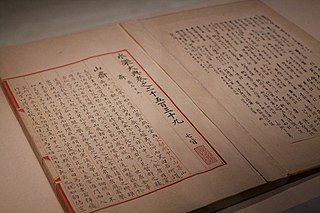
The Yongle Encyclopedia or Yongle Dadian is a Chinese leishu encyclopedia commissioned by the Yongle Emperor of the Ming dynasty in 1403 and completed by 1408. It comprised 22,937 manuscript rolls in 11,095 volumes. Fewer than 400 volumes survive today, comprising about 800 rolls, or 3.5% of the original work.

The Russian Academy of Sciences consists of the national academy of Russia; a network of scientific research institutes from across the Russian Federation; and additional scientific and social units such as libraries, publishing units, and hospitals. Peter the Great established the academy in 1724 with guidance from Gottfried Leibniz.

The National Library of Sweden is Sweden's national library. It collects and preserves all domestic printed and audio-visual materials in Swedish, as well as content with Swedish association published abroad. Being a research library, it also has major collections of literature in other languages.

Firefighting is a profession aimed at controlling and extinguishing fire. A person who engages in firefighting is known as a firefighter or fireman. Firefighters typically undergo a high degree of technical training. This involves structural firefighting and wildland firefighting. Specialized training includes aircraft firefighting, shipboard firefighting, aerial firefighting, maritime firefighting, and proximity firefighting.

The Duchess Anna Amalia Library in Weimar, Germany, houses a major collection of German literature and historical documents. In 1991, the tricentennial of its opening to the public, the Ducal Library was renamed for Duchess Anna Amalia. Today, the library is a public research library for literature and art history. The main focus is German literature from the Classical and the late Romantic eras. The ducal library was supplied, among others, by the bookseller Hoffmann from Weimar as well as with publications from France and Europe by the Strasbourg publishing house Bauer, Treuttel and Würtz. The library was inscribed on the UNESCO World Heritage List as part of the Classical Weimar site because of its testimony to the global cultural importance of Weimar during the late 18th and early 19th centuries during the Weimar Classicism movement.
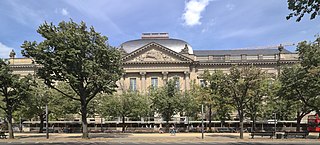
The Berlin State Library is a universal library in Berlin, Germany and a property of the Prussian Cultural Heritage Foundation.
On 20 November 1992, a fire broke out in Windsor Castle, the largest inhabited castle in the world and one of the official residences of the British monarch. The castle suffered extensive damage and was fully repaired within the next five years at a cost of £36.5 million, in a project led by the conservation architects Donald Insall Associates. It led to Queen Elizabeth II paying tax on her income, and to Buckingham Palace, one of her other official residences, being opened to the public to help pay for the restoration work. This event was part of what the Queen called her annus horribilis.
Active fire protection (AFP) is an integral part of fire protection. AFP is characterized by items and/or systems, which require a certain amount of motion and response in order to work, contrary to passive fire protection.

The Academy of Sciences of the Soviet Union was the highest scientific institution of the Soviet Union from 1925 to 1991. It united the country's leading scientists and was subordinated directly to the Council of Ministers of the Soviet Union.

The National Library is the central Polish library, subject directly to the Ministry of Culture and National Heritage of the Republic of Poland. The main seat of the National Library is located in Ochota district of Warsaw, adjacent to the Mokotów Field. It is one of the oldest cultural institutions in Poland, operating in 1747–1795 as Załuski Library, reactivated in 1928.
The 1966 flood of the Arno in Florence killed 101 people and damaged or destroyed millions of masterpieces of art and rare books. It is considered the worst flood in the city's history since 1557. With the combined effort of Italian and foreign volunteers alike, or angeli del fango, many of these fine works have been restored. New methods in conservation were devised and restoration laboratories established. However, even decades later, much work remains to be done.

The Library of the Russian Academy of Sciences is a large state-owned Russian library based in Saint Petersburg on Vasilievsky Island and open to employees of institutions of the Russian Academy of Sciences and scholars with higher education. It is a part of the academy and includes, besides the central collection, the library collections housed by specialized academic institutions in Saint Petersburg and other cities.
The Jewish Theological Seminary Library fire was discovered on Monday, April 18, 1966, at 10:15 AM when smoke was seen pouring from one of the small upper windows of the Jewish Theological Seminary Library tower at Broadway and 122nd Street in Morningside Heights, Manhattan, New York City.
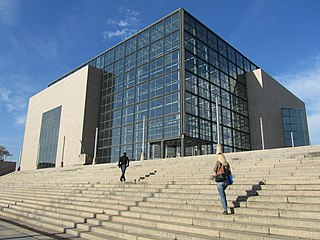
National and University Library in Zagreb (NSK) is the national library of Croatia and central library of the University of Zagreb.

Baikal Airlines Flight 130 was a scheduled domestic passenger flight from Irkutsk to Moscow operated by a Baikal Airlines Tupolev Tu-154 that crashed onto a dairy farm on 3 January 1994 in Mamony whilst the pilots were trying to return to the airport following a mid-air emergency. All 124 people on board were killed. Another one person was killed on the ground.

The Reichsleiter Rosenberg Taskforce was a Nazi Party organization dedicated to appropriating cultural property during the Second World War. It was led by the chief ideologue of the Nazi Party, Alfred Rosenberg, from within the NSDAP Office of Foreign Affairs. Between 1940 and 1945, the ERR operated in France, Netherlands, Belgium, Poland, Lithuania, Latvia, Estonia, Greece, Italy, and on the territory of the Soviet Union in the Reichskommissariat Ostland and Reichskommissariat Ukraine. Much of the looted material was recovered by the Allies after the war, and returned to rightful owners, but there remains a substantial part that has been lost or remains with the Allied powers.

Znanie was a publishing company based in St. Petersburg, Russia founded by Konstantin Pyatnitsky and other members of the Committee for Literacy. It operated from 1898 to 1913.
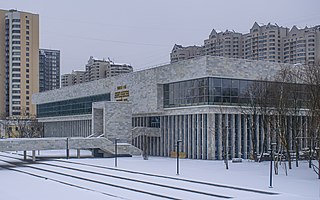
Institute of Scientific Information for Social Sciences of the Russian Academy of Sciences, INION RAN is a major center for research in social studies and humanities. The research center was created in 1969 as a successor to the Russian Academy's Fundamental Library of Social Sciences, which was established in 1918.
